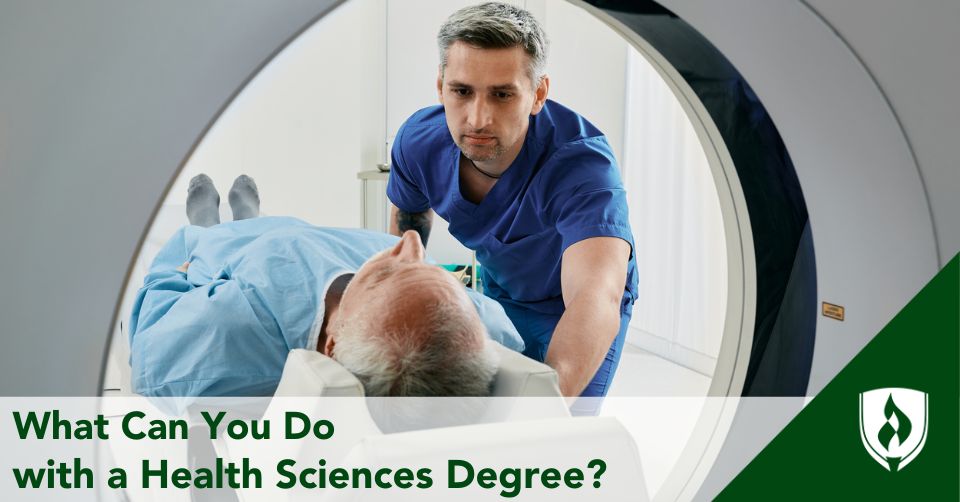
Pursuing a health science degree is an exciting step toward a fulfilling profession, however, the degree may seem a bit ambiguous to some – you might be asking yourself, "What can you do with a health sciences degree?"
While the path may seem a bit unclear at first, the truth is that this field is overflowing with opportunities—from enhancing patient care to leading groundbreaking research. Whether you aim to directly impact health care delivery or assisting with research, your degree can unlock many potential paths.
Beyond clinical and administrative roles, a health sciences degree may have the potential to also open doors to innovative careers in emerging fields like health informatics, where professionals use data and technology to enhance healthcare systems, or in public health, where they develop strategies to address widespread health challenges. The versatility of this type of degree not only positions graduates at the forefront of a dynamic and evolving industry but also enables them to make significant contributions to the well-being of communities and the advancement of medical knowledge.
Career path options with a Health Science Degree
A health sciences degree can offer you many professional possibilities. Pursuing a bachelor's degree is wise because it is essential for many roles in the health sciences field, including healthcare administration, radiologic technologist, surgical technologist and medical assistant.
Whether you’re drawn to patient interaction or prefer working behind the scenes, you’ll find a role that fits your passion.
Leading healthcare facilities and services
Healthcare administration is a thriving career path. As a health services manager, you are typically responsible for healthcare and medical services in a medical practice, department or facility, ensuring efficient operations and quality care.
In this position, you’ll be at the helm of managing healthcare facilities and ensuring top-notch care delivery. Your knowledge in health sciences, paired with strong leadership skills, can empower you to make crucial decisions that influence patient care.
Shaping future healthcare professionals
If working with others and communicating complex concepts appeals to you, a career in healthcare education might be your calling. As a healthcare educator, you can train future healthcare professionals, sharing your expertise to shape the next generation of caregivers.
Promoting public health and well-being
Public health is another exciting avenue. As a public health professional, you’ll work on initiatives that promote healthy living, prevent diseases, and enhance community well-being. Your expertise can be key in developing strategies to tackle public health challenges.
Community health workers play a crucial role in bridging the gap between the people of the community and members of health services teams. They foster trusting relationships, provide necessary resources, and collaborate with healthcare providers to develop community-specific programs.
Enhancing healthcare with technology
Health informatics is a growing field where you can leverage your knowledge of health sciences and technology to optimize healthcare systems. By focusing on the effective use of data, you can help to improve patient care and streamline healthcare processes.
Additional/different education beyond a bachelors degree in health sciences and/or related work experience may be required to work in the field of health informatics. It is important to check with employers regarding requirements. Rasmussen University does not offer any degree programs that specialize in health informatics.
Supporting mental health and wellness
As a mental health assistant, you may assess behaviors and emotions, pinpoint stress triggers and recommend coping strategies to help individuals manage their mental health.
Rasmussen University does not offer any programs that lead to the career opportunity of Mental Health Assistant. Rasmussen University’s Health and Wellness Bachelor’s degree program is not designed to meet, and does not meet, the educational requirements for professional licensure as a therapist, counselor, social worker, psychologist, dietician, personal trainer, or other similar careers in any state.
Industry employment sectors for community health workers
Health sciences expertise is sought after in many industries. Here’s a closer look at where your skills could take you:
Hospitals and healthcare facilities
From hospitals to clinics, these settings depend on health sciences professionals to deliver exceptional care and streamline operations. Health services managers play a vital role in strategizing and overseeing healthcare and medical services in these settings.
It is important to check the education credential (s) and/ or work experience that are required to pursue occupations with hospitals and healthcare facilities.
Pharmaceutical and biotechnology organizations
If you’re passionate about developing new treatments, this industry offers you the chance to be involved in creating groundbreaking medications and therapies.
It is important to check the required education credential and work experience to pursue occupations with this industry where you live.
Public health organizations
Those focused on improving community health and preventing diseases will discover rewarding careers in this sector, with a community health worker contributing in areas such as epidemiology, health promotion, and policy development.
It is important to check the required education credential and work experience to pursue occupations with this industry where you live.
Research institutions
Universities, research centers, and government agencies constantly seek skilled health sciences professionals to assist with their projects and studies.
It is important to check the required education credential and work experience to pursue occupations with this industry where you live.
Technology companies
The technology industry also presents significant opportunities. With the rise of digital health solutions and telemedicine, tech companies need health sciences experts to develop and implement innovative healthcare technologies, positioning you at the forefront of healthcare transformation.
It is important to check the required education credential and work experience to pursue occupations with this industry where you live.
The insurance sector
The insurance and managed care sector is another area where health sciences professionals are highly valued. By working with insurance companies and managed care organizations, you can analyze healthcare needs, improve patient outcomes and ensure cost-effective service delivery, impacting healthcare accessibility and affordability.
By working with insurance companies, you can help manage and improve medical services, ensuring cost-effective and high-quality care.
It is important to check the required education credential and work experience to pursue occupations with this industry where you live.
Skills acquired
Critical thinking and problem-solving in healthcare
Critical thinking and problem-solving are fundamental in healthcare. Your capability to evaluate complex situations, make well-informed decisions and adjust to evolving scenarios will be important in delivering excellent patient care.
Mastering communication and patient interaction
Effective communication skills are essential, enabling you to collaborate with colleagues, explain medical concepts to patients, and advocate for diverse populations’ healthcare needs. Empathy and active listening are crucial in building meaningful patient connections.
Cultivating leadership in healthcare settings
Leadership skills, developed through your studies, will be invaluable as you manage healthcare teams and drive positive industry changes. These include inspiring and motivating others, delegating tasks effectively, and navigating challenging situations with confidence and integrity.
Embracing adaptability and resilience
Adaptability and resilience are key traits you may cultivate. The healthcare landscape is ever-changing, and your ability to embrace new technologies, methodologies and stay committed to patient care will set you apart as a reliable healthcare professional.
Many health sciences graduates pursue additional coursework to meet the admission requirements for medical school and other advanced programs.
It is important to check the specific education credential requirements needed for admission into medical schools and other advanced programs.
Job market outlook
The future looks bright for health sciences graduates. With an aging population and continual medical advancements, the need for healthcare professionals is on the rise.
Healthcare employment is predicted to grow significantly faster than the average for all occupations, translating into numerous job openings across different sectors, according to the Bureau of Labor Statistics. This bodes well for those entering the health sciences field.
Health science degrees provide a strong foundation for entering various healthcare fields, including medicine, allied health professions and research.
However, job prospects can vary based on location, specialization and experience level. Staying informed about industry trends, networking with professionals, and gaining practical experience through internships or volunteering will enhance your career prospects.
Emerging fields like telemedicine, personalized medicine and health informatics offer exciting opportunities for health sciences graduates. The increasing awareness of mental health issues is driving demand for professionals who can provide mental health counseling and support. These innovative areas are transforming healthcare, providing unique challenges and rewards for those passionate about cutting-edge technology and patient care.
It is important to check the education and work experience required to work in the field of telemedicine.
As you explore these exciting career paths, you might wonder how Health Science differs from Medical Science. Understanding these differences can help you make more informed decisions about your future.
The global healthcare landscape is also evolving rapidly, creating chances for health sciences graduates to work internationally, collaborate with diverse teams and address public health issues worldwide.
Addressing global health concerns requires a deep understanding of diverse populations and their specific needs. This global interconnectedness presents opportunities to make significant impacts beyond local communities and improve health outcomes on a larger scale.
The path to a meaningful career in health sciences
A health sciences degree opens the door to a wide range of professional options in healthcare, research, education and beyond.
The skills you acquire during your education will equip you for success in the job market, while the growing demand for healthcare professionals ensures plentiful opportunities. Whether you choose to work directly with patients or make a difference to process and policy, your health sciences degree will empower you to pursue a fulfilling and impactful career.
For more examples of the amazing careers in this field, check out Exploring 12 Healthcare Jobs You Can Launch in 2 Years or Less.
1The Bureau of Labor Statistics, Occupational Outlook Handbook, Healthcare Occupations [accessed August, 2024] https://www.bls.gov/ooh/healthcare/home.htm#:~:text=Overall%20employment%20in%20healthcare%20occupations,who%20leave%20the%20occupations%20permanently.




